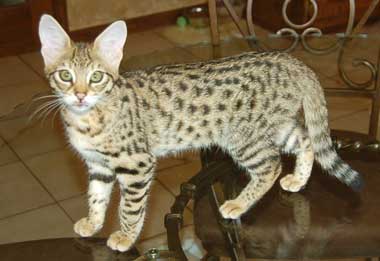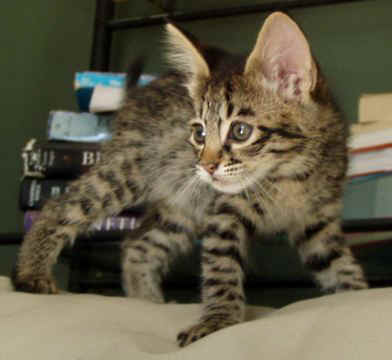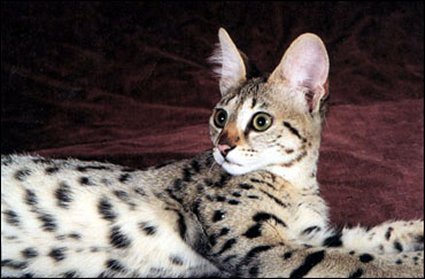



|
Savannah Description
The Savannah should exhibit the wild beauty of its Serval father with the smaller size and temperament of its domestic mother. The head of the cat should form an equilateral triangle, excluding the ears, and should be small in proportion to the body. Ears should be large and high on the head, with rounded tips and slight furnishings. Light colored, horizontal bars on the back of the ears are desirable. Eyes should be set directly beneath a slightly hooded brow, and are a modified almond shape, set at least one eye width apart. Tear stain markings should be present along and between the eye and nose. Vibrant and deep eye color is preferred.
The body of the Savannah should be semi-foreign with a full, deep rib-cage and slight tuck up. The cat is a descendant of the African Serval and should retain the wild appearance of a cat on the savannah. Legs should be long and slender but strong, ending in oval feet with medium toes.
The coat should be short to medium in length with a slightly coarse feel and should mimic the Serval in pattern. There are three color divisions: solid, tabby, and silver/smoked, with only four accepted colors: black, brown spotted tabby, silver spotted tabby, and black smoke.
Savannah Temperament
Many owners have compared the large Savannah to dogs; they are loyal, can be leash trained, and even play fetch. Warm and loving with their families, they are known to greet with a head-butt or pounce. Being a new breed, and depending on generation, socialization is important. They are more comfortable with guests when socialized from a young age. Their intelligence is well noted, and the ideal Savannah is a confident, curious, alert, and friendly cat. Their jumping ability is stunning, 8 feet from standing, and owners must be careful to keep breakables locked away.
The Savannah does not fear water, instead they are known for leaping into large bodies of it and will knock all the water out of a water bowl. They may chirp like the Serval, meow like a house cat or both.
Savannah Care
Despite the exotic appearance and wild background, Savannah's can be raised and cared for like any other house cat. Brushings are appreciated, they enjoy a walk or time outdoors, can eat regular catfood and even use a litterbox!
Savannah History
The in-depth history of the Savannah is a study in genetics. The first cross between a Serval and a domestic house cat was performed in an attempt to learn about feline diseases. The resulting cat caught the eye of breeders and began the long, and still ongoing, trek to create the beautiful breed.
In brief, the genetics of the Savannah are explained through generational numbers F1, F2, F3, F4 and so on. The F1 is the result of the original pairing. As with any crossbreeding of different genotypes, the males of the F1 generation are sterile. Females, however can be crossed with a domestic house cat and create the F2 generation. Sterility is prevalent in males, and may continue up into the F4 generation. This breeding has been the foundation of the Savannah and in the F4 generation, breeders were finally able to breed Savannah to Savannah.
TICA has accepted F3 and lower generations for show as anything higher may contain too much of the wild Serval gene for the average cat owner.
|